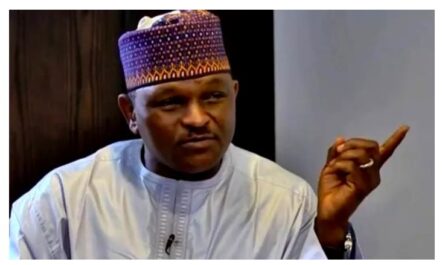From an architectural or engineering sphere, the word structure almost immediately connotes something physical or solid. Outside this sphere, like in business, the word structure would almost always connote arranging or organizing different parts or elements of something complex or grand.
When it comes to politics, ‘structure’ does not solely refer to the physical buildings or offices political parties operate from. Rather, political structure primarily refers to the people who are loyal to a political party and then, of course, all other collective mechanisms in place to make the party appealing and gain influence.
After independence, Nigeria has been ruled by a mix of military and civilian leaders but the subsequent democratic dispensation after the military rule between 1998 and 1999, ushered in the emergence and growth of the two largest political parties in the history of the nation. The Peoples Democratic Party (PDP) in 1998 and later, the All Progressives Congress (APC) in 2013.
More than two decades later, these two parties have expectedly utilized the advantage of time plus other resources to gain an enormous amount of supporters across not just the six geographic political regions across Nigeria, but human capacity in the thirty-six states, seven hundred and seventy-four local governments, towns and further down to grassroots like villages.
In what is statistically confirmed as the most populous black nation on Earth, the impact of the reach of Nigeria’s two foremost political parties is an enormous feat that cannot be trivialised even globally let alone at national level.
Recent Political Developments In Nigeria
It is 2022 and it is yet again that time in Nigeria’s political calendar when the nation is getting ready to elect the candidate for the highest political office but things took a highly unexpected different turn.
A new presidential candidate disrupts the status quo and makes history. He first shuns the two biggest political parties considered the indefatigable producers of viable candidates. Then he pitches his tent at a relatively unknown party. This move should naturally wipe out his chance of ever assuming the presidential office but in a twist of fate, it catapulted the candidate to become the most popular of all candidates in the nation’s presidential race and brought his chosen party, with very little structure, into the limelight.
This sparked a lot of debates on national media and other circles with loyalists from the two most dominant political giants saying that without structure, the new most popular candidate would never stand a chance to win the 2023 elections and his supporters saying his popularity and previous verifiable accomplishments in past political office is more than enough to earn the vote of the populace and put him in power.
The question then begs to be asked if leading political parties claim to have a framework/structure, why haven’t they delivered?
And there is no straight-cut answer however, there are four probable reasons to be explored.
First, Monetization of Political Structures To Attain Political Positions.
Nigerian political parties publicly, privately and shamelessly monetize political positions. At all levels of government, the political structures available in these parties are usually placated with monetary rewards before their approvals are obtained for endorsing political office holders.
In the last presidential nominations across both parties, candidates had to pay eight to nine-figure amounts in the local naira currency (the equivalent of five to six-figure dollar amounts) not only to obtain forms but pay identifiable and unidentifiable people within their parties for approval to contest for the office.
Such crude methods would have been a public show of shame and caused an uproar in countries that understand and practice true democracy.
It is obvious that when the selection process of earning party nominations as well as the overall election process is highly monetized, there will be expectations on future public office holders to return favours which will eventually be syphoned from public funds.
This is one of the clear reasons why regardless of the expansive political structures Nigeria’s largest political parties have, they are deficient in delivering sound political agendas after being elected.
Second, Poor Understanding Or Outright Ignorance Of The Role Of Leadership
A huge number of people in leadership positions in Nigeria are products of the huge political structures offered by the major rival contemporary parties. However, the quality of their leadership contributions, if any at all, is enough evidence to show that they have completely missed the mark as regards the fundamental reason they occupy their offices in the first place.
Many political office holders cannot articulate in simple sentences the functions of their office and even when campaigning, their responses to basic questions about their purpose of pursuing political leadership are largely cut and paste responses.
Quickly sampling several interviews of several Nigerian politicians, it is easy to observe generalised responses like wanting to provide good roads, water, light, education and healthcare as a goal for getting into office. They are largely ignorant of the imminent problems facing their communities and bereft of any practicable ideas to move their communities forward.
After assuming office, many Nigerian political leaders are privy to several local and even international leadership exchanges and training programs. The knowledge they are exposed to never really translates to problem solving for their communities.
Even after clearly under-performing, their goals shift to how they can stay in power as long as possible, become political godfathers themselves and continue to grow their personal wealth through the public treasury.
This is another reason why politicians who are products of parties with large structures never really contribute anything impactful to change the course of leadership in whatever political position they occupy.
Thirdly, Personal Interest And Godfatherism Above Collective And National Interest
Many entrants into Nigeria’s political scene via the parties with huge political structures have chequered reputations in their previous career choices. Sometimes their outright unemployed status was a motivation to pursue active politics and not a desire to serve the nation.
There are several accounts and even court cases questioning the character and integrity of several past and current Nigerian political office holders ranging from false academic certifications to corruption allegations like embezzlement even before attaining office.
In their newfound political pursuits, they seek mentors who they can emulate on their political pathway. Closer bonds develop over time when these mentors have made a considerable investment of personal time, goodwill, and even finances in their mentees to facilitate their
eventual attainment into political offices.
When their dreams manifest, the piper (their godfathers) start playing the tune. Criminal benevolence to their political benefactors and to themselves from the coffers of public office becomes a resultant institution far above setting good governance standards and progressive goals for the people they govern.
Many political leaders (past and present) that the leading parties with huge political structures brought to power have poor antecedents. Such candidates subsequently manifest questionable mechanisms for looting the nation’s public treasury and relegating good governance into oblivion.
Fourth, The Nigerian Constitution Is Flawed
At this point let us look outside the workings or limitations of the political parties themselves.
Even if an argument is made for the adequacy/sufficiency of the structure of the existing political parties to elect qualified candidates into positions of leadership, the limitations of the nation’s constitution is inadequate to compel politicians with good intent who eventually get elected into office, to perform in the best interest of the Nigerian people.
A critical examination of the Nigerian constitution reveals a document drafted by the nation’s former colonial masters on behalf of the people with provisions that are largely inadequate, obsolete and do not represent the interest of a very populous plus extremely diverse multicultural and multiethnic nation.
Even though past constitutional conferences have reviewed and addressed the inadequacies of the existing constitution, subsequent Nigerian Governments have, obviously for selfish reasons, ignored and refused to implement its recommended updates.
As long as the political needs of a diverse set of people which probably can best be met through a loose confederation rather than a unitary federal state, are still regulated by an outdated constitution, elected politicians will still function below capacity regardless of the structures that brought them to leadership positions.
Conclusion
This article cannot exhaustively discuss several more reasons why leading political parties in Nigeria have not delivered on basic let alone advanced expectations of the Nigerian citizenry despite decades of growing their structures to enormous magnitudes that have produced a large proportion of the country’s past and current political office holders.
Political structures are not enough to transform Nigeria’s leadership and usher in the desired infrastructural and economic advancement the citizenry earnestly desire.
In addition, the larger the structure the more complex it is to shed ineffective methodologies that have driven the country to a state of despair.
Structure is simply not enough.
Change in extreme anomalies in Nigeria’s political climate, for the advancement of the Nation, will be witnessed when the drivers of that change imbibe value systems that will deliver transparency as well as accountability at all leadership levels.
It is perhaps a realization of the inadequacy and inefficiency of leaders provided by the nation’s existing political structures that have sensitized the citizenry on the need to embrace and promote candidates with competent pedigree and proven track records rather than candidates whose ticket to political office is simply the endorsement of the parties that provide them the structure to contest elections.
Maybe hopefully the nation of Nigeria is truly on its way to a new era where leadership is recognised as a servitude position rather than an autocratic master role and citizens will not only expose incompetence but also boldly demand accountability at every level of governance in the country.




